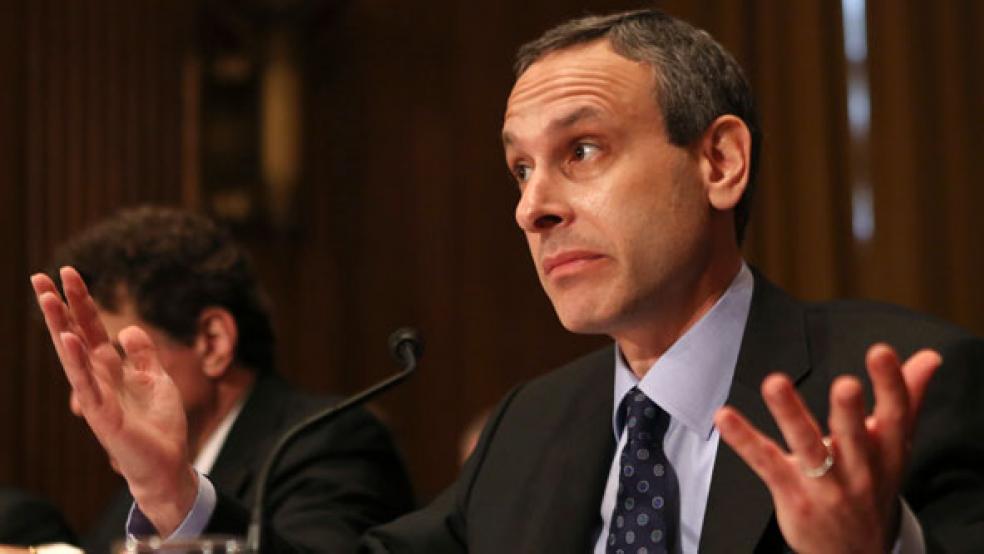Acting IRS commissioner Steven Miller – with a day left before his forced retirement – was too busy to submit a written statement for the Senate Finance Committee.
The Internal Revenue Service finds itself engulfed in scandal, after employees in Washington targeted for review applications for non-profit status for Tea Party-based groups. Miller was removed from office last week by Treasury Secretary Jack Lew, after the release of an inspector general’s audit provoked a firestorm of criticism over the targeting.
“Given time considerations, the IRS was unable to prepare written testimony,” Miller told the committee Tuesday.
His predecessor as IRS commissioner, Douglas Shulman, sat next to him in the hearing room, similarly unable to provide much insight as to why a Cincinnati field office developed a watch list for organizations with names that included the terms “Tea Party” or “Patriot.” The targeting started in March, 2010, and after being halted by IRS officials at headquarters in Washington – but not the commissioners – began again at the start of 2012.
Shulman, who denied any political targeting in a previous congressional appearance last year, claimed Tuesday to not know how this happened in the agency he oversaw from 2008 to 2012.
“I can’t say that I know that answer,” Shulman said. “I’m six months out of office.”
Senate Finance Committee Chairman Max Baucus summarized one growing issue of consensus between congressional Democrats and Republicans.
“If you don’t know, it sounds like somebody wasn’t doing his job,” the Montana Democrat said.
The hearing featured two agency heads who seemed oblivious to the problematic targeting, too preoccupied with the task for technology updates and processing of 140 million individual tax returns to respond to congressional concerns with candor.
The 2010 Supreme Court ruling on Citizens United lifted restrictions on political spending by non-profits, causing a wave of 501(c)(4) “social welfare” applications to be filed with the IRS. When Sen. Rob Portman, R-Oh., and Sen. Orrin Hatch, R-Utah, expressed concern in a letter about conservatives facing strict reviews, Shulman as IRS commissioner issued a denial before an internal team had finished looking into the evidence.
And when it became apparent last year that targeting was, in fact, taking place, neither took immediate action to set the record straight on Capitol Hill.
As IRS commissioner until November of 2012, Shulman said he only knew that the term “Tea Party” was being used to select organizations for deeper background checks. He maintains that his responsibility was to allow the inspector general to conduct its audit. “If I hear something that is a concern ... if I get some of the facts but not all of the facts … the proper place for it to be is in the inspector general’s hands.”
“You should have corrected the record – and you should have done it long before today,” Hatch said. “It’s a lie by omission.”
The IRS took steps to acknowledge the targeting only this month, in advance of the inspector general’s audit being released. Miller, as acting commissioner, had a question to an IRS official planted at a conference. “Obviously, the entire thing was an incredibly bad idea,” he told the committee.
Treasury Secretary Jack Lew also commented about the IRS fiasco in testimony before the Senate Banking and Urban Affairs Committee on Tuesday. Top Obama administration officials knew of the inquiry, but decided not to inform the president, who learned of the issue via news reports on May 10.
Lew first heard about the audit in March of this year and has asked Danny Werfel, previously controller for the Office of Management and Budget, to serve as the new acting IRS commissioner beginning on Wednesday.
Werfel is to overhaul the agency to prevent the problem from being repeated, but Lew vowed not to be too muscular in his own oversight of the IRS: “I will not cross that line into the administration of the tax system, because the cure could be worse than the disease.”
The White House has maintained that it follows a “cardinal rule” to not tinker with the IRS on reports by inspector generals. Obama has stressed that the IRS must be non-partisan in how it enforces the tax code.
But the exact role played by politics remains somewhat foggy. The inspector general’s audit noted that there was no outside influence pushing the IRS to target conservative groups. However, the statements came from IRS bureaucrats who were not under oath.
“Have you reached the conclusion that there was none or you haven’t found it?” Sen. Mike Crapo, R-Idaho, asked at the Finance Committee hearing.
The answer from J. Russell George, the Treasury Inspector General for Tax Administration, only raised more questions.
“It’s the latter,” he said.


